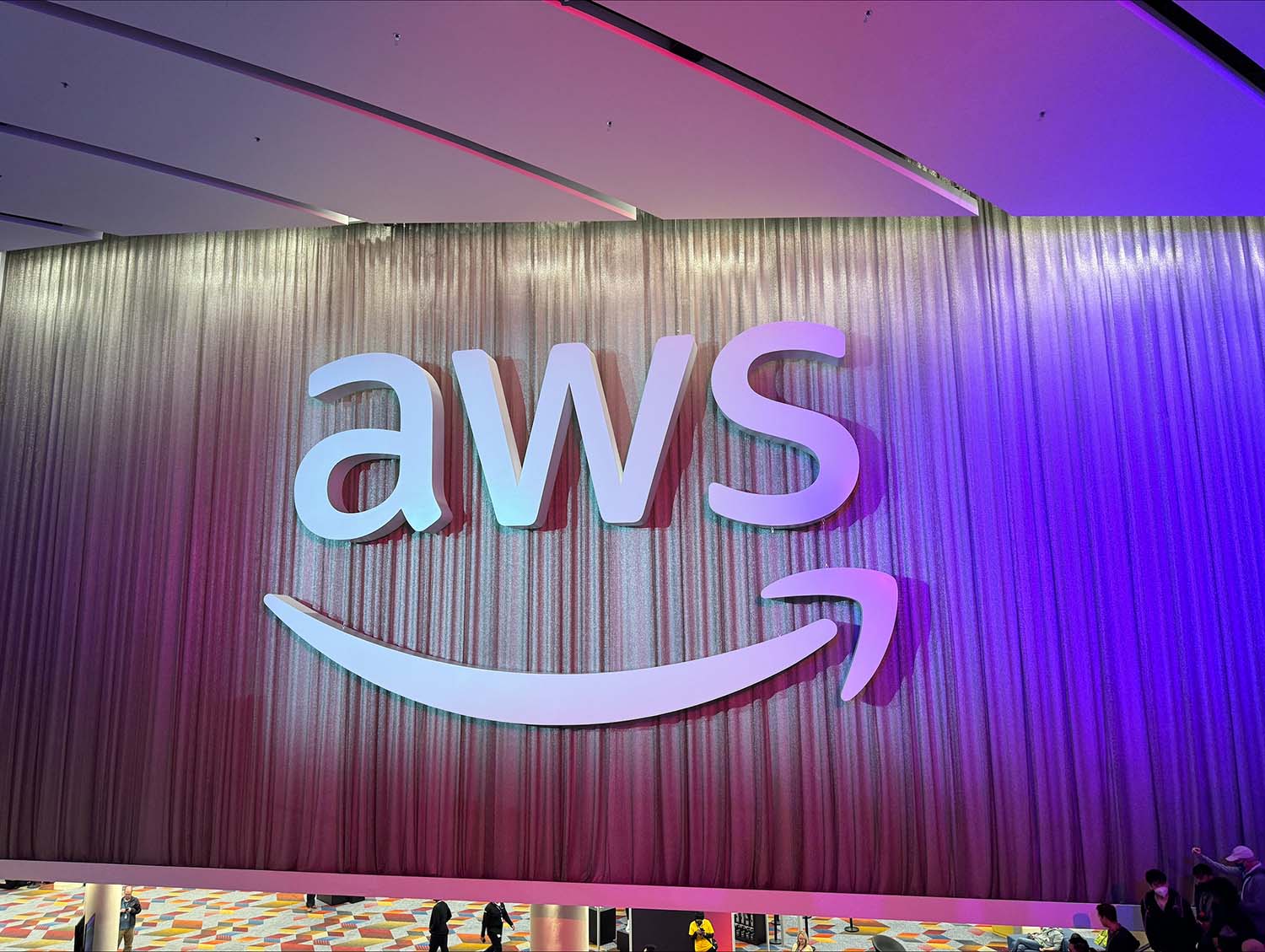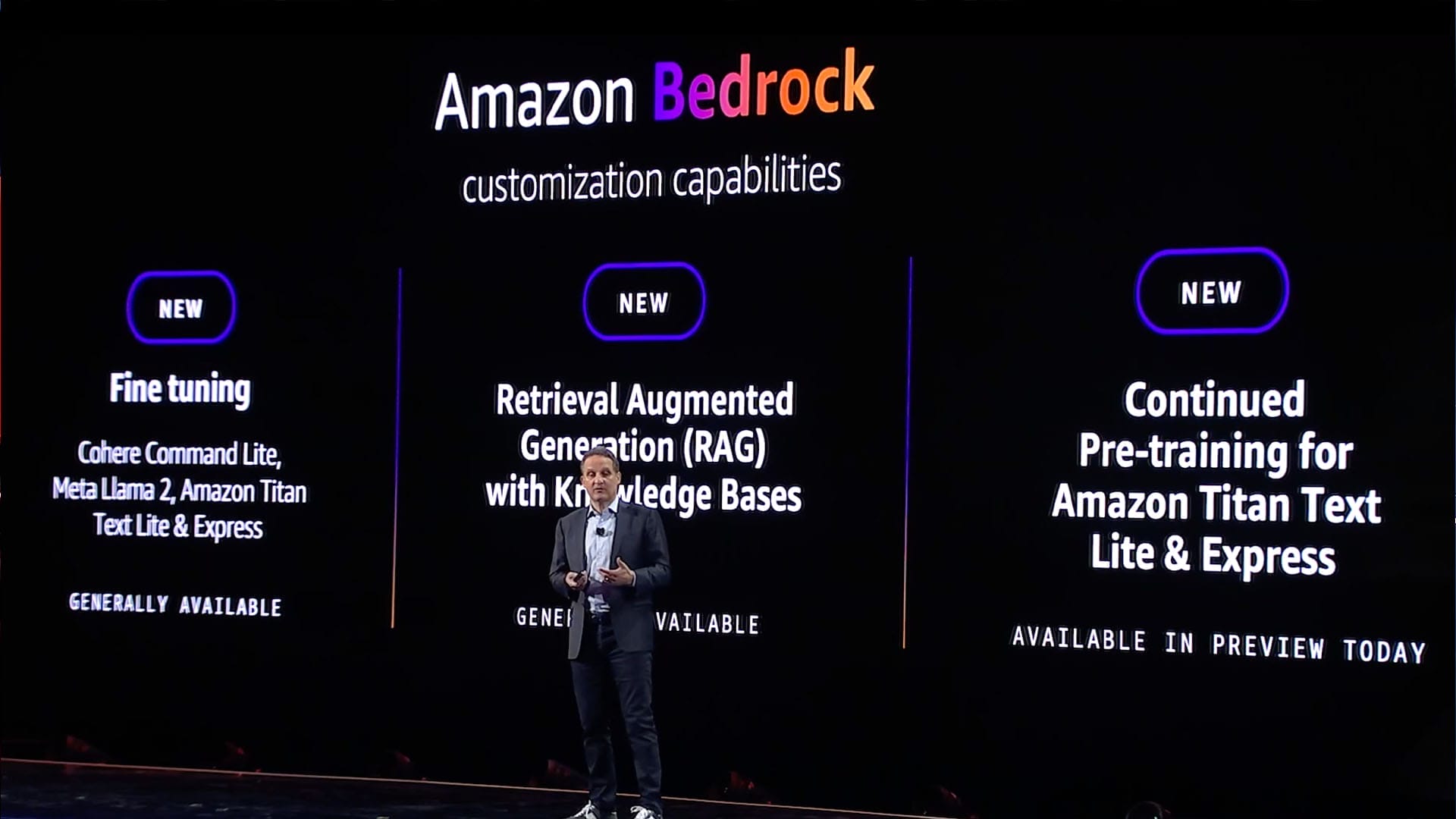Hello from Las Vegas! AWS re:Invent 2023 is underway, and we’ve just heard Adam Selipsky, CEO of Amazon Web Services, lay out his vision for the future of cloud transformation. Adam had much to say about data, infrastructure, AI & ML, but before we delve into the details and announcements, it makes sense to look back (briefly) at the incredible changes we’ve experienced since re:Invent 2022.
The past 12 months may well be remembered as “the year of AI,” or at least, the year in which AI’s potential exploded into the public consciousness. In April, the widely-viewed CBS 60 Minutes interview of Google’s Sundar Pichai created a media furor around artificial intelligence. And in July, at the AWS New York Summit, VP Swami Sivasubramanian announced seven generative AI innovations, ranging from new foundation models for Amazon Bedrock to generative business intelligence (BI) for Amazon QuickSight, enabling users to access BI insights with natural language questions. Increasingly, there’s a sense that AI and ML are out of the lab and ready for real-world business applications. At the same time, the IT community is fully aware that “it takes a cloud” for AI & ML to reach their potential.
According to the World Economic Forum, more than 75% of organizations plan to adopt big data, cloud computing, and AI in the next five years – and that eagerness for NextGen technology extends across all industries and market caps. For example, AWS has a customer base of more than 1.5 million businesses, and as we were proudly told at re:Invent 2022, “Of 1000 unicorns, 83% run on AWS.” However, AWS also has a number of customers with annual revenues exceeding $80B (each), including Apple, Meta, Johnson & Johnson, General Electric, Pfizer, and Walt Disney, as well as many customers in the $1B to $50B revenue range. Clearly, cloud and AI have gone mainstream, even on “main street.”

It's also notable that as of today, the fastest-growing AWS offering – from their galaxy of products and services – is Amazon EC2 (Elastic Compute Cloud), outpacing even AWS stalwarts such as S3, Aurora, DynamoDB and RDS. EC2 lets users create and run virtual machines in the cloud, offering virtual servers to manage any kind of workload. The EC2 value prop is simple: customers get the most suitable processors, networking facilities, and storage systems, within the overarching AWS security envelope. Meanwhile, across the galaxy of products and services (mentioned above), the current “Top 5 AWS Categories” are Infrastructure Software, DevOps, Business Applications, Machine Learning, and IoT.
With all of this as background, Adam Selipsky made several major announcements – and one significant prediction – at this morning’s keynote session, drawing upon the connected themes of partners, software, and hardware. Selipsky announced a significant expansion of the AWS partnership with Salesforce, and the integration of the Amazon Connect call center application with the Salesforce Service cloud. Further, customers will now be able to leverage Amazon Bedrock and Salesforce Einstein together, empowering them to develop better & faster AI/ML solutions. And AWS is introducing three hardware and software innovations of its own, focused specifically on AI performance: Graviton 4 chips that are 40% faster at running database workloads; AWS Tranium chips, optimized for training foundation models (FMs) with trillions of parameters; and Amazon SageMaker to help customers build, train and deploy ML models at scale.

The AI/ML theme continued as Jensen Huang, Nvidia Co-founder and CEO, joined Adam on stage. AWS has also expanded this key hardware/software partnership, and has made it possible for cloud customers to access up to 20,000 Nvidia GPUs in a single cluster, effectively powering their solutions with super-computer capability. Already, AWS has deployed more than 3,000 exascale super-computers, and Jensen Huang noted that soon, “zetascale computing” will become a practical reality. The impact will be a 50% reduction in the time required to train massive LLMs.
So, what was the major prediction, mentioned above? According to Adam Selipsky, “There is not going to be one model (i.e., an FM) to rule them all.” And this leads directly to the central goal of Amazon Bedrock: choice. As Adam pointed out, Bedrock allows customers to choose from a variety of industry-leading FMs from AI21 labs, Amazon, Anthropic, Cohere, Meta, and Stability AI. AWS is committed to making more models available, to ensure that Bedrock is the easiest way to build & scale generative AI applications with LLMs and other FMs.
Xebia has news of its own, which is bound to expand our range of cloud customers and our relationship with AWS. In our new office in Atlanta, Xebia is creating a strategic hub for Xebia's innovative engineers, digital consultants, and technology visionaries. Globally, Xebia employs more than 5,500 skilled professionals and is rapidly expanding – our new Atlanta office will bring together the brightest minds in the industry, amplifying Xebia’s capacity to deliver bespoke solutions that meet the challenges faced by our clients in the Americas.
Xebia has built global teams with tremendous knowledge and experience across seven technology specialties: Agile, Cloud, DevOps, Data and AI, Software Technology, Low Code, and Microsoft Services. The American zone is the largest market for AWS cloud services, and Xebia intends to operate at the forefront of cloud technology by leveraging our professional & managed AWS services. Today, Xebia is an AWS Premier Consulting and Training Partner with 15 years of AWS experience, 10+ AWS Competencies and Partner Funding programs, 200+ current AWS certifications and accreditations. We were named Benelux Consulting & Migration Partner of the Year for 2021, and our Enterprise Cloud Services provide everything you need to get up and running on the AWS cloud.
So, how does a “cloud journey” proceed, at the enterprise level? To begin, the word consulting is key. At its heart, Xebia is a consultancy as much as a digital engineering firm. In each engagement, we seek to uncover all the possibilities and opportunities that cloud holds for your business. Based on your maturity and requirements, we’ll create a detailed plan that includes migrating legacy applications, training your teams, incorporating security and reliability, and optimizing your cloud spend.
What follows is cloud engineering, cloud-native software development, and cloud optimization: from serverless applications and infrastructure as code, to development according to cloud-native design principles, we’ll help you build a first-time-right cloud platform, including performance efficiency. And let’s not forget, a cloud platform is just the foundation. Xebia can increase the benefits by offering Cloud Cost Management and Managed Services, including cost-efficient tools and processes to ensure continuous innovation.
Ultimately, we aim to guide our customers to become self-sufficient and innovative on a successful and cost-effective cloud journey.
Stay tuned as we continue to cover AWS re:Invent 2023, and offer ‘our take’ on your future in the cloud.




